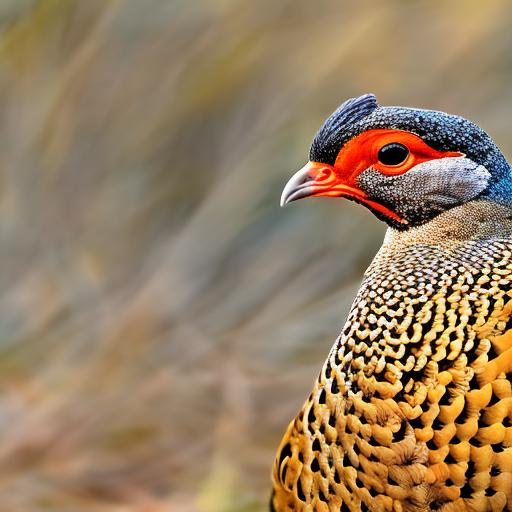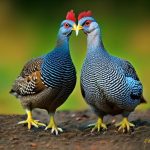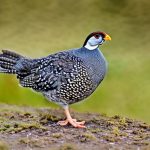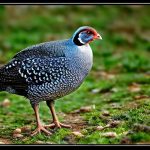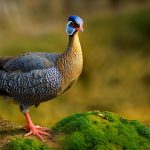Guinea fowl, like many other poultry, have specific needs during the winter months. Understanding these needs is crucial for ensuring the health and well-being of your flock. In winter, guinea fowl require shelter from the cold, protection from predators, and a consistent source of food and water. They also need to be kept entertained to prevent boredom and stress. Additionally, it’s important to monitor their health and wellness during this time, as they may be more susceptible to certain illnesses in the colder months. By understanding and addressing these needs, you can help your guinea fowl thrive throughout the winter season.
Guinea fowl are native to Africa, where they are accustomed to warmer climates. As a result, they are not as well-equipped to handle cold temperatures as some other poultry species. During the winter, guinea fowl require shelter that provides protection from wind, rain, and snow. They also need access to a warm and dry environment to roost at night. Additionally, guinea fowl need a consistent source of food and water to maintain their energy levels and stay hydrated. It’s important to understand that their dietary needs may change in the winter, as they may require additional nutrients to help them stay healthy and maintain their body temperature. By understanding these specific needs, you can ensure that your guinea fowl are well-cared for during the winter months.
Key Takeaways
- Guinea fowl need protection from cold temperatures and wet conditions in winter
- Provide a dry, draft-free shelter with adequate ventilation for guinea fowl in winter
- Feed guinea fowl a balanced diet with extra protein and fat to help them stay warm in winter
- Protect guinea fowl from predators by securing their shelter and using deterrents
- Monitor the health of guinea fowl and provide necessary supplements to support their immune system in winter
- Keep guinea fowl entertained with toys, treats, and opportunities for foraging in winter
- Gradually introduce guinea fowl to outdoor conditions as the weather warms up in spring
Providing appropriate shelter for guinea fowl in winter
When it comes to providing shelter for guinea fowl in winter, there are a few key considerations to keep in mind. First and foremost, it’s important to provide a warm and dry environment for your flock to roost at night. This can be achieved by providing a well-insulated coop with plenty of bedding to keep them warm. Additionally, it’s important to ensure that the coop is well-ventilated to prevent moisture buildup, which can lead to respiratory issues in guinea fowl. Providing perches for them to roost on can also help keep them off the cold ground and provide additional warmth.
In addition to a warm and dry coop, it’s important to provide outdoor shelter for your guinea fowl during the day. This can be in the form of a covered run or access to a sheltered area where they can escape the elements. Providing windbreaks and additional bedding in these outdoor areas can help keep your guinea fowl comfortable during the winter months. It’s also important to regularly clean and maintain their shelter to prevent the buildup of moisture and bacteria, which can lead to health issues for your flock. By providing appropriate shelter for your guinea fowl in winter, you can help them stay warm, dry, and healthy throughout the colder months.
Feeding and watering guinea fowl during the winter months
Feeding and watering guinea fowl during the winter months requires careful attention to their specific dietary needs and the challenges presented by cold weather. In winter, guinea fowl may require additional nutrients to help them maintain their body temperature and energy levels. It’s important to provide a balanced diet that includes high-quality poultry feed, as well as access to fresh water at all times. Additionally, offering supplemental treats such as mealworms or cracked corn can help provide extra energy for your flock during the colder months.
When it comes to watering guinea fowl in winter, it’s important to prevent their water source from freezing. This can be achieved by using heated waterers or regularly checking and replacing frozen water throughout the day. It’s also important to ensure that their water source is kept clean and free from debris, as guinea fowl are susceptible to certain illnesses that can be transmitted through contaminated water. By paying close attention to their feeding and watering needs, you can help ensure that your guinea fowl stay healthy and well-nourished throughout the winter season.
Protecting guinea fowl from predators in winter
Protecting guinea fowl from predators in winter is crucial for their safety and well-being. In colder months, predators may be more desperate for food and more willing to take risks to catch their prey. It’s important to take extra precautions to secure their coop and outdoor areas to prevent predators from gaining access to your flock. This can be achieved by using sturdy fencing with buried wire mesh to prevent digging, as well as adding locks or latches to coop doors and windows.
Additionally, it’s important to regularly inspect their shelter for any signs of damage or weak spots that could provide an entry point for predators. Providing adequate lighting around their coop can also help deter nocturnal predators such as raccoons or owls. It’s also important to consider using predator deterrents such as motion-activated lights or sound devices to scare off potential threats. By taking proactive measures to protect your guinea fowl from predators in winter, you can help ensure their safety and reduce the risk of losses due to predation.
Managing the health and wellness of guinea fowl in winter
Managing the health and wellness of guinea fowl in winter requires careful observation and proactive care. In colder months, guinea fowl may be more susceptible to certain illnesses such as respiratory infections or frostbite. It’s important to monitor your flock for any signs of illness or injury, such as lethargy, coughing, or swollen feet. Providing a clean and dry environment, as well as regular access to fresh water and high-quality feed, can help support their immune system and overall health.
Regularly inspecting their feet for signs of frostbite and providing additional bedding in their coop can also help prevent cold-related injuries. It’s important to have a plan in place for addressing any health issues that may arise, such as having a trusted veterinarian who is familiar with poultry care. By staying proactive about managing the health and wellness of your guinea fowl in winter, you can help prevent illness and ensure that they stay happy and healthy throughout the colder months.
Tips for keeping guinea fowl entertained during the winter
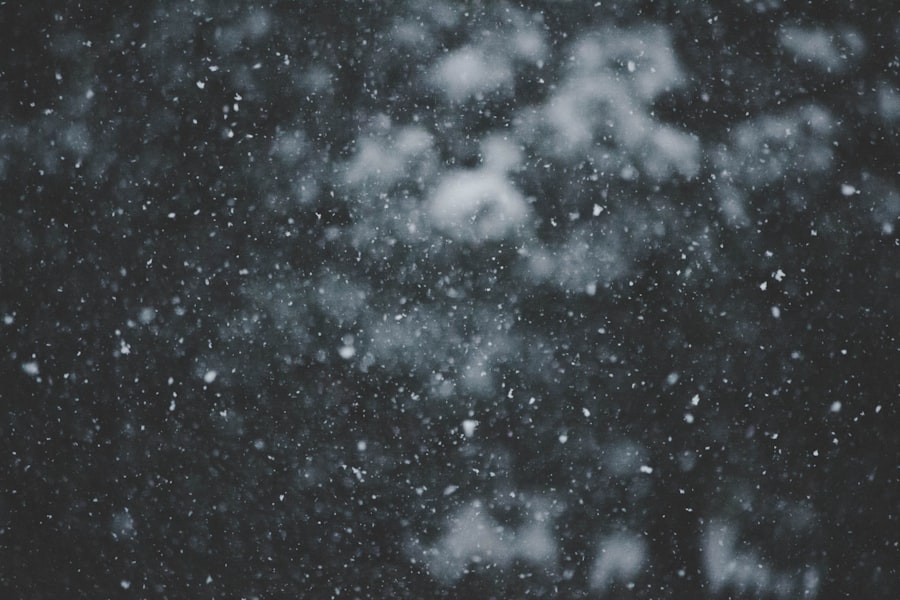
Keeping guinea fowl entertained during the winter is important for preventing boredom and stress, which can lead to behavioral issues or decreased egg production. There are several ways to keep your flock entertained during the colder months, such as providing enrichment activities like hanging treats or toys in their coop or run. This can include items such as cabbage heads or suet feeders that they can peck at for entertainment and additional nutrition.
Additionally, providing access to a dust bath area can help keep your guinea fowl occupied and provide them with an opportunity for natural behaviors such as dust bathing. Offering perches or platforms for them to roost on during the day can also provide mental stimulation and exercise. It’s also important to spend time interacting with your flock regularly, as they are social animals that benefit from human interaction. By providing enrichment activities and spending time with your guinea fowl, you can help keep them entertained and content throughout the winter season.
Preparing guinea fowl for the transition to spring
As winter comes to an end, it’s important to start preparing your guinea fowl for the transition to spring. This can include gradually increasing their access to outdoor areas as temperatures warm up, as well as providing opportunities for them to forage for insects and other natural foods. It’s also important to gradually reintroduce them to any free-ranging areas if they have been confined during the winter months.
Additionally, it’s important to monitor their health closely during this transition period, as they may be more susceptible to certain illnesses as they adjust to changes in temperature and environment. Providing access to fresh greens and other natural foods can help support their digestive health as they transition back to a more varied diet. It’s also important to consider any changes in their housing or management needs as they transition back into warmer weather, such as adjusting ventilation or cleaning routines.
By taking proactive steps to prepare your guinea fowl for the transition to spring, you can help ensure a smooth adjustment period and support their overall health and well-being as they move into the new season.
If you’re considering keeping guinea fowl during the winter months, it’s essential to ensure they have a warm and secure shelter. In addition to proper housing, it’s also important to consider the heating options for your guinea fowl coop. For more insights on converting a shed into a suitable coop and choosing the right heater for your poultry, check out the article on heater options for a chicken coop. This resource provides valuable tips and recommendations for creating a comfortable environment for your guinea fowl during the colder seasons.
FAQs
What are some important considerations for keeping guinea fowl in winter?
Guinea fowl are hardy birds, but they still require some special considerations in the winter. It’s important to provide them with a draft-free shelter, plenty of bedding for warmth, and access to fresh water that doesn’t freeze.
How can I keep my guinea fowl’s water from freezing in the winter?
To prevent their water from freezing, you can use heated waterers or add a small amount of apple cider vinegar to their water to lower the freezing point. It’s also important to check their water frequently and break up any ice that forms.
What should I feed my guinea fowl in the winter?
In the winter, guinea fowl may need a higher protein diet to help them stay warm. You can supplement their diet with mealworms, black oil sunflower seeds, or a higher protein feed to help them maintain their energy levels.
How can I protect my guinea fowl from predators in the winter?
In the winter, predators may be more desperate for food and more likely to target your guinea fowl. Make sure their coop is secure and consider adding motion-activated lights or alarms to deter predators.
Do guinea fowl need any special care for their feet in the winter?
Guinea fowl are generally hardy and don’t require special care for their feet in the winter. However, it’s still important to keep their coop clean and free of moisture to prevent any foot issues.
Meet Walter, the feathered-friend fanatic of Florida! Nestled in the sunshine state, Walter struts through life with his feathered companions, clucking his way to happiness. With a coop that’s fancier than a five-star hotel, he’s the Don Juan of the chicken world. When he’s not teaching his hens to do the cha-cha, you’ll find him in a heated debate with his prized rooster, Sir Clucks-a-Lot. Walter’s poultry passion is no yolk; he’s the sunny-side-up guy you never knew you needed in your flock of friends!

